
A lawyer for the jailed members of Russian punk band Pussy Riot on Monday appealed against the three women's conviction for a protest against President Vladimir Putin at a church altar, but said he had little hope the verdict would be overturned.
Nadezhda Tolokonnikova, 22, Maria Alyokhina, 24, and Yekaterina Samutsevich, 30, were convicted of hooliganism motivated by religious hatred after their February protest in Moscow's Christ the Saviour Cathedral.
The two-year prison sentences handed down to the activists for a "punk prayer" asking the Virgin Mary to rid Russia of Putin have drawn sharp criticism from Western governments and musicians who say they should not be jailed.
Kremlin critics have called the jailing of the young women part of a clampdown that shows Putin will have little tolerance for dissent in a six-year presidential term he started in May following the biggest protests of his 12-year rule.
"If the court abides by the law it would throw out the verdict," said defense lawyer Nikolai Polozov.
"But being realists, understanding all the efforts the state has put into this case, we think it's unlikely the verdict will be overturned," he told Reuters by telephone.
Polozov said he hopes the sentences will be shortened or made conditional, meaning the women would be released instead of serving the 19 months or so that remain in their two-year sentences following their jailing in March.
But he said he has seen signs of a backlash against the Western support that may not bode well for softer sentences.
He cited critical reports in Russian media and suggestions supporters of Pussy Riot were behind the reported felling of wooden Christian crosses in two Russian regions over the weekend, which he alleged were a "provocation" aimed to discredit the group.
"This is a reaction to the support from the world community," said Polozov. "This does not increase our optimism."
The maximum sentence for the crime the women were accused of was seven years in jail, but after Putin said they had done "nothing good" but "should not be judged too harshly" the state prosecutor asked for three-year sentences.
Hours after the sentences were issued on August 17, the Russian Orthodox Church urged the state to show mercy to the women, raising the possibility it might back a presidential pardon or a reduction in their terms.
But a senior church representative on Monday seemed to suggest the women of Pussy Riot had not shown enough remorse.
"The Church called on the state to show mercy with the framework of the law in the hope they would not do anything like this again," Interfax quoted Vsevolod Chaplin, head of the church department for relations with society, as saying.
However, he said, "We know that some of them are now trying to justify what they did, and moreover, they say that certain actions will continue," Interfax quoted Chaplin as telling reporters in the southern city of Stavropol.
After police said they were searching for other members of Pussy Riot, a Twitter account called Pussy Riot Group - used by the group in the past - said this weekend that two members had fled Russia and "are recruiting foreign feminists to prepare new actions!"
On Wednesday, the Russian Foreign Ministry denounced Western criticism of the trial as politically motivated and said there were "elements of a clash of civilizations" in the Western condemnation.
© Thomson Reuters.




